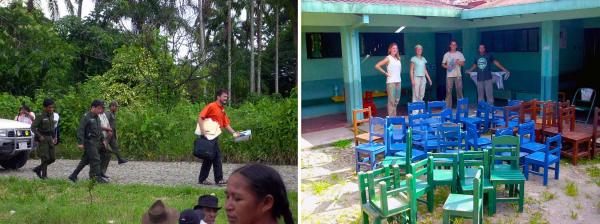In March, I arrived in Colombia with very little knowledge of Spanish. Although I'd taken some classes, they had mostly focused on grammar and not so much on conversation. Although my program didn’t require knowing Spanish, it quickly became apparent that if I wanted to be able to function in everyday life, I needed to at least become somewhat conversational.
I started watching movies and TV shows in Spanish (with Spanish subtitles), tried reading Spanish magazines in the checkout line at the grocery store, and attempted to say the occasional sentence besides, “Hola! Cómo estás?” But I still didn’t feel like I was improving.
I’m a person who thrives on structure so I knew that a classroom setting would work best for me. Another English Teaching Fellow pointed me to the Spanish immersion program called Sperience. The program is a mix of in-class work, which focuses on grammar and improving reading comprehension, and cultural excursions that work towards improving listening and speaking skills.
The main takeaway from the experience is to practice while increasing vocabulary. These are some of the techniques that I use to continue practicing (in addition to Google Translate and Duolingo):
1. Books
Amazon and Audible have become my best friends. I have come across Spanish e-books that help me improve my reading comprehension while using Spanish audiobooks to focus on listening skills. The technique that I use when reading is to read a few pages at a time then go back and write down the words I don’t recognize, look them up using a Spanish-English dictionary, then read the pages again. I do the same thing with audiobooks, listening in 10-minute blocks, looking up the words that I don’t recognize, and going back to listen to that block again. After going through the audiobook in this manner, I listen to it in its entirety.
2. Movies and music.
Watching movies in Spanish with Spanish subtitles helps with improving both listening and reading. It’s especially helpful to watch movies that I've already watched in English. Since I already know the plot, I can focus on building vocabulary. If it’s a movie that I haven’t seen before or it’s not available in English, then I use the books technique watching a scene at a time.
3. Conversation.
This is almost like an assessment. All the vocabulary that is built gets put into practice. Speaking with native Spanish speakers—particularly with those who are not bilingual—can be nerve-wrecking at first, but native speakers are really patient with those that are learning and are eager to help.
These tips have helped to reinforce what I was learning in my Spanish classes, but these can definitely be applied to those who want to learn another language and are not able to enroll in an immersion program in another country. Practicing every day, at least 30 minutes each day, has been key in how quickly my Spanish language skills have progressed since arriving in Colombia.
Add this article to your reading list




